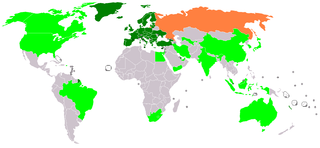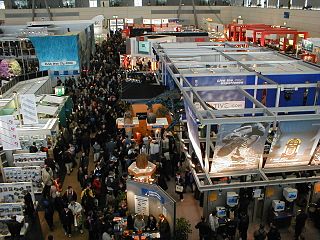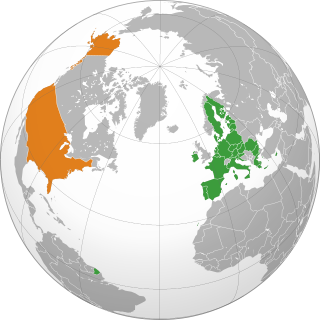Related Research Articles

Iran's telecommunications industry is almost entirely state-owned, dominated by the Telecommunication Company of Iran (TCI). Fixed-line penetration in 2004 was relatively well-developed by regional standards, standing at 22 lines per 100 people, higher than Egypt with 14 and Saudi Arabia with 15, although behind the UAE with 27. Iran had more than 1 mobile phone per inhabitant by 2012.

The International Trade Administration (ITA) is an agency in the United States Department of Commerce that promotes United States exports of nonagricultural U.S. services and goods.

The Consumer Technology Association (CTA) is a standard and trade organization representing 1,376 consumer technology companies in the United States. CTA works to influence public policy, holds events such as the Consumer Electronics Show (CES) and CES Asia, conducts market research, and helps its members and regulators implement technical standards. CTA is led by president and CEO Gary J. Shapiro.
The Association for Progressive Communications (APC) is an international network of organizations that was founded in 1990 to provide communication infrastructure, including Internet-based applications, to groups and individuals who work for peace, human rights, protection of the environment, and sustainability. Pioneering the use of ICTs for civil society, especially in developing countries, APC were often the first providers of Internet in their member countries.
SEMI is an industry association comprising companies involved in the electronics design and manufacturing supply chain. They provide equipment, materials and services for the manufacture of semiconductors, photovoltaic panels, LED and flat panel displays, micro-electromechanical systems (MEMS), printed and flexible electronics, and related micro and nano-technologies.
The InterNational Committee for Information Technology Standards (INCITS),, is an ANSI-accredited standards development organization composed of Information technology developers. It was formerly known as the X3 and NCITS.
Compete America is a coalition representing corporations, universities, research institutions and trade associations that advocate for reform of United States immigration policy for highly educated foreign-born professionals.
The Information Technology and Innovation Foundation (ITIF) is a U.S. nonprofit public policy think tank based in Washington, D.C., focused on public policy surrounding industry and technology. As of 2019, the University of Pennsylvania ranks ITIF as the most authoritative science and technology policy think tank in the world. In its role in developing industrial and technological policies, ITIF has attracted controversy for its affiliations with various technology companies.
The World Innovation, Technology and Services Alliance (WITSA) is a consortium of associations from the information and communications technology (ICT) industry around the world. The group claims that it represents over 90% of the world ICT market through its global membership, and has a goal of advancing the growth and development of the ICT industry. WITSA was founded in 1978 as the World Computing Services Industry Association, and participates in advocacy in international public policy that affects the "global information infrastructure". It voices the concerns of the international IT industry in organizations such as the World Trade Organization, the Organisation for Economic Co-operation and Development, and the G7.

The European Telecommunications Standards Institute (ETSI) is an independent, not-for-profit, standardization organization in the field of information and communications. ETSI supports the development and testing of global technical standards for ICT-enabled systems, applications and services.

The BC Tech Association, formally the British Columbia Technology Industry Association (BCTIA), is a not-for-profit member-funded trade association in British Columbia, Canada, which promotes the technology industry in the province. The technology industry in BC has been growing steadily since the late 1990s and constituted 5.9% of British Columbia's economic output in 2007.
TechAmerica is a United States technology trade association. It was formed from the merger of AeA, the Cyber Security Industry Alliance (CSIA), the Government Electronics & Information Technology Association (GEIA), and the Information Technology Association of America (ITAA) in 2009. The organization claims to be the "high-tech industry's leading trade association". TechAmerica represents 1,200 companies within the public and commercial sectors of the economy. TechAmerica's stated goal is to provide "grassroots to global" representation for its members. To this end, the organization maintains an advocacy program in all 50 US state capitals, in Washington, DC, and in several international locations. In May 2014, CompTIA, a nonprofit trade association that serves IT professionals, announced it had acquired TechAmerica in a move to expand its public-sector presence.

CeBIT was the largest and most internationally representative computer expo. The trade fair was held each year on the Hanover fairground, the world's largest fairground, in Hanover, Germany. In its day, it was considered a barometer of current trends and a measure of the state of the art in information technology. It was organized by Deutsche Messe AG.
Cambashi is an Anglo-American industry analyst firm, focused on the market for Information Technology in the manufacturing, distribution, energy, utilities and construction industries. The company serves both suppliers and users of Information technology. It provides advisory services suppliers in its field, especially in the fields of Product Lifecycle Management and Industrial Automation applications such as Manufacturing Operations Management.

The Egyptian Ministry of Communications and Information Technology (MCIT) is a government body headquartered in Smart Village Egypt, Giza Governorate, in the Cairo metropolitan area. Established in 1999, the Ministry is responsible for information and communications technology (ICT) issues in the Arab Republic of Egypt including the planning, implementation and operation of government ICT plans and strategies. It is led by the Minister of Communications and Information Technology, who is nominated by the Prime Minister and is a member of the cabinet. The current ICT Minister is Amr Talaat who assumed the position on 14 June 2018.
The information technology sector in Bangladesh had its beginnings in nuclear research during the 1960s. Over the next few decades, computer use increased at large Bangladeshi organizations, mostly with IBM mainframe computers. However, the sector only started to get substantial attention during the 1990s. Today the sector is still in a nascent stage, though it is showing potential for advancement. Nonetheless, Bangladesh IT/ITES industry has fared comparatively well by achieving US$1.3 billion export earnings in FY 2020-21 and holding US$1.4 billion equivalent market share in the local market contributing 0.76 per cent to the GDP creating more than 1 million employment opportunities so far amid Covid-19 havoc that suddenly shattered businesses last year. Consequentially, riding on the successes of IT/ITES sector-supported export-led industries as well as pro-private sector and conducive policies pursued by Bangladesh Government, the country is now poised to become a Developing Country by 2026, as recommended by the United Nations Committee for Development Policy (UNCDP), besides, Bangladesh now seeks to transform itself into a knowledge-based and 4IR-driven cashless economy, aiming to become a developed country by 2041. The Bangladesh government has formulated a draft 'Made in Bangladesh– ICT Industry Strategy' aimed at turning Bangladesh into an ICT manufacturing hub, enhancing export of local products, attracting foreign investment and creating employment proposing to implement in three
Note: This special working group has been disbanded.

P@SHA/PASHA (1992–Present) is a functional trade body and registered association for the IT industry in Pakistan, primarily to promote and develop the software and services industry in Pakistan and to protect the rights of its members.

The Trade and Technology Council (TTC) is a transatlantic political body which serves as a diplomatic forum to coordinate technology and trade policy between the United States and European Union. It is composed of ten working groups, each focusing on specific policy areas. The formation of the TTC was first announced by US President Joe Biden and the European Commission President Ursula von der Leyen on June 15, 2021. The early agenda focused primarily on US-EU cooperation in technology, strategic sectors, market access, trade, democratic values and rule of law in the digital world, supply chain resilience, the global trade order and the EU's developing regulatory agenda like Digital Services Act, Data Act and Cloud Rules. The TTC was established under the leadership of five co-chairs – European Commission Executive Vice-President Margrethe Vestager, European Commission Executive Vice-President Valdis Dombrovskis, US Secretary of State Antony Blinken, US Secretary of Commerce Gina Raimondo, and US Trade Representative Katherine Tai.
References
- ↑ "Information Technology Industry Council Home Page". ITI. Retrieved 2010-08-17.
- ↑ "May 17, 2010 article in The Hill highlighting ITI's recognition of Rep, Mccaul as legislator of the year". ITI. Retrieved 2010-08-17.[ permanent dead link ]
- 1 2 John Timmer: IT group: stimulus money needed for broadband, smart grid Ars Technica, January 8, 2009
- ↑ "Background Information on ITI". pspcentral.org. Archived from the original on 2011-07-17. Retrieved 2010-08-17.
- ↑ "Information Technology Industry Council Staff Page". ITI. Retrieved 2019-07-03.
- 1 2 History of ITI Itic.org, retrieved August 12, 2010
- ↑ "New York's E Waste Legislation". Environmental Leader. June 1, 2010. Retrieved 2010-08-17.
- ↑ "Tech Daily Dose, Tech Groups prepare lobbying blitz". National Journal. March 19, 2009. Archived from the original on December 6, 2010. Retrieved 2010-08-17.
- ↑ "USITO Testifies on China's Compliance with its WTO Commitments". tiaonline.org. Retrieved 2010-08-17.
- ↑ "INCITS, InterNational Committee for Information Technology Standards - What is INCITS?". Archived from the original on 2010-07-05. Retrieved 2010-08-12.
- ↑ "ITI Members - Information Technology Industry Council". www.itic.org. Retrieved 2022-03-30.